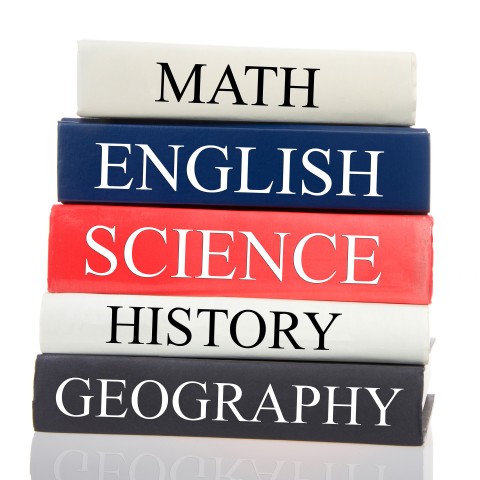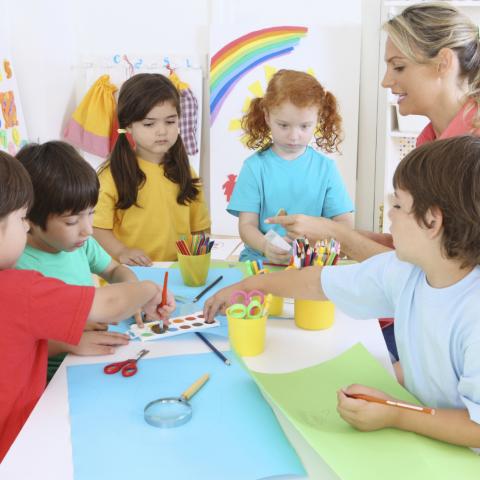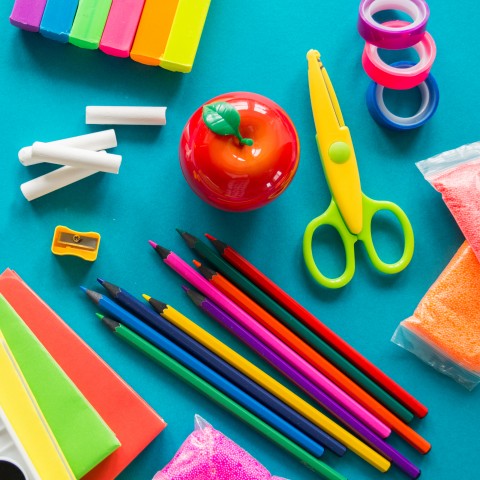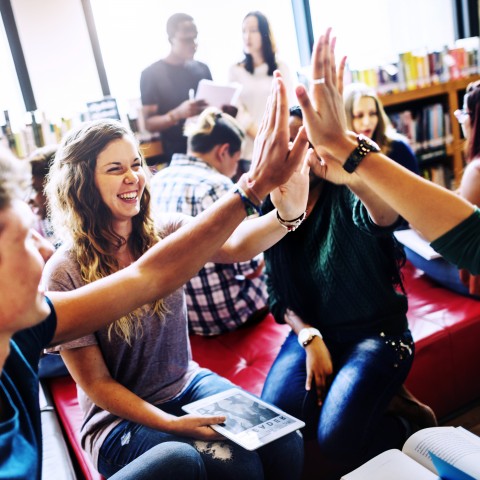
Studying takes up a large part of our lives, and very often when learning a new language from scratch you get acquainted with new vocabulary in a classroom that will be useful further in life. Therefore, today we will talk about school and university vocabulary.
The topic of education is very extensive, but in this article, we will try to mention the main things that interest people who study Russian. For example, there are a lot of school subjects or school supplies surrounding us in everyday life, and it will be especially useful to know what they are called. So, we suggest talking about the education process in Russian language learning and its essential vocabulary.

Do you know the names of school subjects in Russian?
Here you can learn the names of school subjects, accessories, expressions, teacher’s commands and instructions, and other Russian words. Let’s get started with the classroom phrases in our Russian language learning path.
 Table of Contents
Table of Contents
1. School Vocabulary
A) Types of educational institutions in Russia
The first educational level in Russia is kindergarten. It offers not only daycare for children aged 1-7 but special educational programs suitable for each group. Children play, draw, dance, and learn letters and numbers; even, sometimes, foreign languages. There are state kindergartens and private ones.

Early childhood education is very important
Детский сад. – Detskiy sad. – “Kindergarten.”
People usually shorten this name to just:
Садик. – Sadik. – “Kindergarten.”
The next level is school. It consists of three steps: elementary school, middle school, and high school. All three can be combined in one actual building under one name, or they can be separate schools.
Школа. – Shkola. – “School.”
In Russia, a school with an in-depth study of the humanitarian sciences is often called a “gymnasium,” and with an in-depth study of physical and mathematical sciences – a “lyceum.”
Гимназия. – Gimnaziya. – “Gymnasium.”
Лицей. – Litsey. – “Lyceum.”
In Russia, education up to grade 9 is considered compulsory. Parents or guardians are required by law to ensure that a child will attend a school or get home education and pass all state exams. But whether you want to proceed to the 10th and 11th grade, you can decide for yourself, together with the family. You can drop studying, go to 10th grade or go to a special college.
Educational institutions with the name “college” are like technical schools. This word doesn’t mean higher education institutions. Graduates are qualified as technicians, managers, accountants, salesmen, and so on. A college diploma gives the right to enter a university. Technical schools and colleges give vocational secondary education.
Техникум. – Tekhnikum. – “Technical school.”
Колледж. – Kolledzh. – “College.”
In Russia, the following types of higher educational institutions are established: institute, university, academy. Each has its own specifics.
Институт. – Institut. – “Institute.”
Университет. – Universitet. – “University.”
Академия. – Akademiya. – “Academy.”
B) School Subjects
The following are some subjects of the school curriculum studied in elementary, middle, and high schools.
Математика. – Matematika. – “Mathematics.”
Музыка. – Muzyka. – “Music.”
Физкультура. – Fizkul’tura. – “Physical training.”
Граждановедение. – Grazhdanovedeniye. – “Civic studies.”
Литература. – Literatura. – “Literature.”
География. – Geografiya. – “Geography.”
Алгебра. – Algebra. – “Algebra.”
Естествознание. – Yestestvoznaniye. – “Natural science.”
C) School Supplies
School supplies in Russian – let’s learn everything that is on the table.
Тетрадь. – Tetrad’. – “Notebook.”
Ручка. – Ruchka. – “Pen.”
Карандаш. – Karandash. – “Pencil.”
Стирательная резинка. – Stiratel’naya rezinka. – “Eraser.”
Линейка. – Lineyka. – “Ruler.”
Маркер. – Marker. – “Marker.”
Учебник. – Uchebnik. – “Textbook.”
Did you forget your textbook or lose the pen? Let’s ask your fellow students for help.
У тебя есть запасная ручка? Кажется, я потерял свою. – U tebya yest’ zapasnaya ruchka? Kazhetsya, ya poteryal svoyu. – “Do you have a spare pen? I seem to have lost mine.”
| — О, нет. Я забыл учебник по математике. — Возьми мой. Сделай копию заданий в библиотеке. | — O, net. Ya zabyl uchebnik po matematike. — Voz’mi moy. Sdelay kopiyu zadaniy v biblioteke. | “— Oh no. I forgot my math textbook. — Take mine. Make a copy of tests in the library.” |

Did you also use all of these at school?
You can find more classroom vocabulary in our article and watch a free video with Katya.
2. Communicating with Teachers
A) Greetings
In the Russian lesson, a student can address a teacher only using the first name with patronymic. In some countries, for example, in the Scandinavian countries, you can use a name in combination with the “Ты” form (informal). But not in Russia. Also, in Russia, students do not address the teacher by the name of the profession, i.e. “Hello, teacher” sounds pretty strange. So, to address a teacher or professor in Russia, you need to know his or her first name and patronymic and also use the “Вы” form (formal).
Доброе утро, Валентина Петровна. – Dobroye utro, Valentina Petrovna. – “Good morning, Valentina Petrovna”

In Russian you address your teacher (or any other person you are not on first-name terms with) by their name and patronymic
B) Instructions
Very often, elementary-level students are not ready to accept instructions in Russian. Therefore, it is better to begin any course with the study of instructions in order not to spend a lot of class time explaining them. Learn Russian words and Russian phrases for class to understand the teacher’s instructions.
Откройте ваш учебник на странице 56. – Otkroyte vash uchebnik na stranitse 56. – “Open your textbook on page 56.”
Прочитайте слова в рамке. – Prochitayte slova v ramke. – “Read the words in the box.”
Решите задачи “а” и “б” в упражнениях 545, 546 и 547. – Reshite zadachi a i b v uprazhneniyakh 545, 546 i 547. – “ Solve problems “a” and “b” in exercises 545, 546 and 547.”
Внимательно прослушайте диалог и подготовьте ответы на вопросы. – Vnimatel’no proslushayte dialog i podgotov’te otvety na voprosy. – “Listen carefully to the dialogue and prepare answers to the questions.”
Произнесите это слово по буквам. – Proiznesite eto slovo po bukvam. – “Spell this word”
Работайте в парах. Разыграйте диалог. – Rabotayte v parakh. Razygrayte dialog. – “Work in pairs. Act out the dialogue.”
C) Questions from the teacher and getting clarifications
Всё понятно? – Vsyo ponyatno? – “Is everything clear?”
Кого сегодня нет в классе? – Kogo segodnya net v klasse? – “Who is absent today?”
Кто пойдёт к доске? – Kto poydyot k doske? – “Who will go to the blackboard?”
Извините, я не успеваю. Вы можете повторить ещё раз? – Izvinite, ya ne uspevayu. Vy mozhete povtorit’ eshchyo raz? – “Sorry I can’t keep up. Can you repeat one more time, please?”
Можно задать вопрос? – Mozhno zadat’ vopros? – “Can I ask you a question?”
Уточните, пожалуйста. – Utochnite, pozhaluysta. – “Please, clarify it.”
D) Discipline, Absence and Tardiness
Learn Russian classroom phrases for students to make excuses for tardiness and to explain the absence. Here are also a few phrases to understand when the teacher asks for discipline.
Я нехорошо себя чувствую. Я не могу сегодня пойти в школу. – Ya nekhorosho sebya chuvstvuyu. Ya ne mogu segodnya poyti v shkolu. – “I’m not feeling well. I won’t be able to attend school today.”
Извините за опоздание. Трамвай встал на мосту. Электричество закончилось. – Izvinite za opozdaniye. Tramvay vstal na mostu. Elektrichestvo zakonchilos’. – “Sorry I’m late. The tram just stood on the bridge. The electricity has run out.”
Тишина! – Tishina! – “Silence!”
Иванов, сядь на место! – Ivanov, syad’ na mesto! – “Ivanov, sit down!”
На задней парте — тихо! – Na zadney parte — tikho! – “In the back, be quiet!”
3. Communicating with Classmates
A) Greetings

School friendship can last for a long time
Here are some useful classroom phrases in Russian that you can hear communicating with other students.
— Привет! Идёшь сегодня на физру? — Нет, я забыл дома форму. – Privet! Idyosh’ segodnya na fizru? — Net, ya zabyl doma formu. – “– Hey, are you going to the gym today? – No, I forgot my uniform.”
— Привет! Ты сделал домашнее задание по математике? — Нет, я ничего не понял. — Privet! Ty sdelal domashneye zadaniye po matematike? — Net, ya nichego ne ponyal. – “— Hey! Did you do your math homework? — No, I didn’t understand anything.”
До завтра, Ваня. Встретимся утром у класса химии. – Do zavtra, Vanya. Vstretimsya utrom u klassa khimii. – “See you tomorrow, Vanya. Meet me in the morning at the chemistry class.”
B) Favorite Subjects
Each of us has our favorite and least favorite lessons, there are boring ones, and there are those that we cannot stand. Let’s say it in Russian.
Мой любимый предмет — математика. – Moy lyubimyy predmet — matematika. – “My favorite subject is math.”
Терпеть не могу физику. Зачем она вообще нужна? – Terpet’ ne mogu fiziku. Zachem ona voobshche nuzhna? – “I can’t stand physics. Why do we need it at all?”
У меня хорошо получается сочинять истории. Я люблю писать сочинения. – U menya khorosho poluchayetsya sochinyat’ istorii. Ya lyublyu pisat’ sochineniya. – “I’m good at writing stories. I love writing essays.”
C) Talking About Teachers and Timetables
Мария Петровна заболела. Сегодня не будет математики. – Mariya Petrovna zabolela. Segodnya ne budet matematiki. – “Maria Petrovna fell ill. There will be no math today.”
Тест по химии перенесли на субботу. – Test po khimii perenesli na subbotu. – “The chemistry test has been moved to Saturday.”
В пятницу у меня окно второй парой. Пойдём вместе в библиотеку. – V pyatnitsu u menya okno vtoroy paroy. Poydyom vmeste v biblioteku. – “On Friday I have a free period instead of the second double class. Let’s go to the library together.”
D) Tests Instructions
In order to quickly and correctly complete tasks in Russian, you need to understand well what you are asked to do. Here are some useful phrases in Russian tests.
Отмечайте правильный выбор только на матрице, в тесте ничего не пишите. – Otmechayte pravil’nyy vybor tol’ko na matritse, v teste nichego ne pishite. – “Mark the correct choice only in the matrix, do not write anything in the test!”
Задания рекомендуется выполнять одно за другим. – Zadaniya rekomenduyetsya vypolnyat’ odno za drugim. – “Tasks are recommended to be completed one by one.”
Вы не можете пользоваться калькулятором во время экзамена. – Vy ne mozhete pol’zovat’sya kal’kulyatorom vo vremya ekzamena. – “You cannot use a calculator while taking the test.”
Выберите правильную форму глагола. – Vyberite pravil’nuyu formu glagola. – “Choose the correct form of the verb.”
4. Conclusion
Now you know Russian classroom words and phrases — how to talk about the school schedule in Russian, what are the names of school items and supplies, how to communicate with the teacher and fellow students, and what are the main teachers and test instructions. Do you know some other Russian words that you often use in classrooms? Please share in the comments below.
Do you want to learn Russian vocabulary? Be sure to check RussianPod101.com. If you want to learn Russian on your own for free, then this site is for you. Here you can find free Vocabulary lists, video lessons, and Russian grammar guides.
With our premium service MyTeacher you get one–on–one personal training sessions and can practice classroom vocabulary, improve pronunciation and ask questions. An experienced tutor will help you learn Russian very quickly. Learn Russian with RussianPod101 and improve your skills on daily basis.









